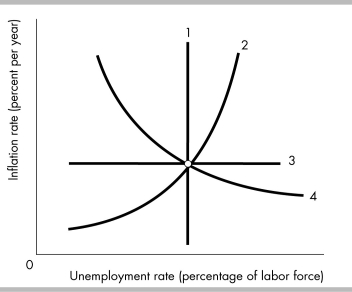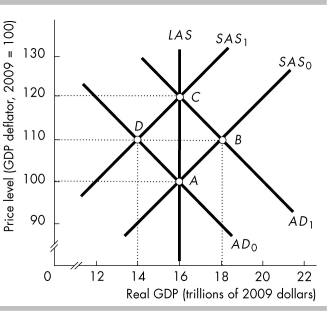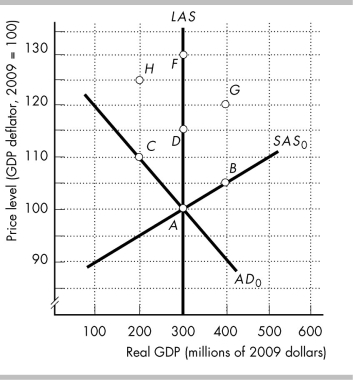Exam 12: The Business Cycle, Inflation, and Deflation
Exam 1: What Is Economics?479 Questions
Exam 2: The Economic Problem440 Questions
Exam 3: Demand and Supply515 Questions
Exam 4: Measuring GDP and Economic Growth395 Questions
Exam 5: Monitoring Jobs and Inflation407 Questions
Exam 6: Economic Growth353 Questions
Exam 7: Finance, Saving, and Investment225 Questions
Exam 8: Money, the Price Level, and Inflation578 Questions
Exam 9: The Exchange Rate and the Balance of Payments492 Questions
Exam 10: Aggregate Supply and Aggregate Demand428 Questions
Exam 11: Expenditure Multipliers469 Questions
Exam 12: The Business Cycle, Inflation, and Deflation410 Questions
Exam 13: Fiscal Policy263 Questions
Exam 14: Monetary Policy227 Questions
Exam 15: International Trade Policy200 Questions
Select questions type
Which of the following is the factor that leads to business cycles in the monetarist business cycle theory?
(Multiple Choice)
4.8/5  (37)
(37)
Which of the following describes the Keynesian approach to the business cycle?
I.Unanticipated shocks to aggregate supply drive expansions and recessions.
II.The Keynesian theory is a real business cycle model of the economy.
III.A decrease in business confidence can trigger a recession.
(Multiple Choice)
4.8/5  (35)
(35)
For an economy at full employment, an increase in the quantity of money will lead to which of the following sequences of shifts in aggregate demand and supply curves?
(Multiple Choice)
4.8/5  (37)
(37)
"Shoe Industry under Pressure Amid Rising Costs "
Rising costs have forced about 15 per cent of shoe manufacturers in a major south China industrial centre to shut down or relocate in the past year... [the firms have] identified rising wages as a key factor behind the closures and relocations from Dongguan...The problems in the footwear industry reflect broader issues affecting manufacturers across China's Pearl River Delta..."
Www)ft.com, 2/26/2008
As the same pressures affect other industries across China, we expect to see
(Multiple Choice)
4.9/5  (43)
(43)
According to real business cycle theory proponents, an increase in productivity ________ the demand for loanable funds, ________ the demand for labor, and ________ the supply of labor. The real interest rate will ________.
(Multiple Choice)
4.8/5  (31)
(31)
Which of the following could lead to demand-pull inflation?
(Multiple Choice)
4.8/5  (46)
(46)
A demand-pull inflation occurred in the United States during most of the later part of the
(Multiple Choice)
4.7/5  (38)
(38)
Which of the following is NOT a potential start of a demand-pull inflation?
(Multiple Choice)
4.9/5  (36)
(36)
 -In the above figure, which of the following curves represents the long-run Phillips curve?
-In the above figure, which of the following curves represents the long-run Phillips curve?
(Multiple Choice)
4.7/5  (26)
(26)
 -In the above figure, suppose that the economy is at point A when the quantity of money increases. In the short run, the economy will move to point ________.
-In the above figure, suppose that the economy is at point A when the quantity of money increases. In the short run, the economy will move to point ________.
(Multiple Choice)
4.7/5  (42)
(42)
The Keynesian explanation of the business cycle rests on several concepts, including
(Multiple Choice)
4.8/5  (43)
(43)
The short-run Phillips curve shows the ________ relationship between ________.
(Multiple Choice)
4.9/5  (41)
(41)
Suppose that last year the economy of Suffera was experiencing an expected inflation rate of 8 percent and unemployment rate of 12 percent. An unexpected increase in the inflation rate would
(Multiple Choice)
4.7/5  (36)
(36)
The key difference between the new classical theory of the business cycle and the new Keynesian theory of the business cycle is that the new classical theory believes that ________ while the new Keynesian theory believes that ________.
(Multiple Choice)
4.7/5  (37)
(37)
In the Keynesian business cycle theory, business cycles begin with changes in
(Multiple Choice)
4.8/5  (33)
(33)
 -The figure above shows the initial aggregate demand curve, AD?, the initial short-run aggregate supply curve, SAS?, and the long-run aggregate supply curve, LAS. The points in the figure show possible combinations of real GDP and the price level at which the economy of Atlantia is in macroeconomic equilibrium. The economy is initially at point A. Then, Atlantia's oil producers form a price-fixing organization and increase the price of oil. Suppose that potential GDP does not change and that Atlantia's Central Bank takes no action. Draw the new aggregate demand and short-run aggregate supply curves in the figure to show the effects of this event on Atlantia's real GDP and price level.
a)What happens to aggregate supply and aggregate demand?
b)What are the new equilibrium real GDP and price level?
c)Will the rise in the price of oil lead to inflation in Atlantia? Why or why not?
-The figure above shows the initial aggregate demand curve, AD?, the initial short-run aggregate supply curve, SAS?, and the long-run aggregate supply curve, LAS. The points in the figure show possible combinations of real GDP and the price level at which the economy of Atlantia is in macroeconomic equilibrium. The economy is initially at point A. Then, Atlantia's oil producers form a price-fixing organization and increase the price of oil. Suppose that potential GDP does not change and that Atlantia's Central Bank takes no action. Draw the new aggregate demand and short-run aggregate supply curves in the figure to show the effects of this event on Atlantia's real GDP and price level.
a)What happens to aggregate supply and aggregate demand?
b)What are the new equilibrium real GDP and price level?
c)Will the rise in the price of oil lead to inflation in Atlantia? Why or why not?
(Essay)
4.7/5  (27)
(27)
Showing 161 - 180 of 410
Filters
- Essay(0)
- Multiple Choice(0)
- Short Answer(0)
- True False(0)
- Matching(0)